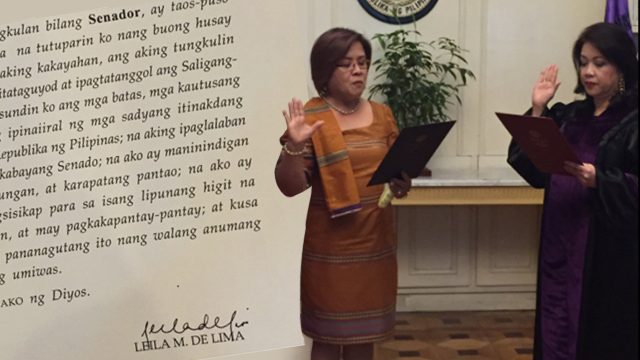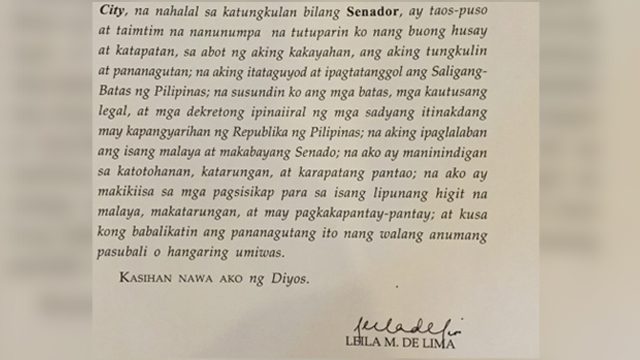SUMMARY
This is AI generated summarization, which may have errors. For context, always refer to the full article.

Senator Leila de Lima’s oath as she was sworn into office on Thursday, June 30, felt like a reflection of her years spent as Commission on Human Rights (CHR) chairperson.
The Supreme Court’s Public Information Office (SC-PIO) posted on Twitter a copy of the former justice secretary’s “personalized” oath, adding that it had traces of a “human rights bias.”
Prior to heading the Department of Justice under the administration of former president Benigno Aquino III, De Lima served as CHR chair from 2008 to 2010 under the administration of ex-president Gloria Macapagal Arroyo.
It was during her chairmanship when the CHR initiated its probe into the Davao Death Squad (DDS) and its alleged links with then Davao City mayor and now President Rodrigo Duterte.
The findings, however, were released only in 2012. The CHR resolution found “probable cause” and recommended that the Office of the Ombudsman investigate the “possible administrative and criminal liability” of Duterte in relation to the numerous killings under his watch as Davao City mayor.
The investigations, however, have been “closed and terminated,” according to a letter sent by the Office of the Ombudsman to the CHR in January 2016. (READ: Davao Death Squad: What ever happened to the investigations?)

Against lowering criminal liability, death penalty
In a statement, De Lima said that her first batch of bills seek to deliver on her campaign promise of improving the justice system in the Philippines and upholding human rights.
The neophyte senator strongly opposes the lowering of age of criminal liability from 15 to 12 years old. Instead of lowering it, De Lima proposes imposing “stiffer” penalties against parents and people who use minors in unlawful activities.
“The children are among the marginalized,” she said. “This bill will place accountability where it is most just: on the shoulders of predators.”
De Lima is also against reinstating the death penalty as capital punishment is “discriminatory to the poor, unchristian, and has not been shown to prevent crimes.”
To answer the rise of crimes in the Philippines, the senator seeks to file a bill on qualified reclusion perpertua for heinous crimes. This bill, she described, will be “an antidote to death penalty.”
“Death penalty, even if severe, is no deterrent to crime,” De Lima said. “The cases that do get filed undergo so many years of trial, and even then, a conviction is not guaranteed.”
“Let’s fix first our criminal justice system to ensure swift delivery of justice,” she added.
The neophyte senator’s stand is very different from Duterte, a man whom she has constantly been at loggerheads with.
However, during her official proclamation on May 19, De Lima said she will support the 16th president of the Philippines if he follows the rule of law and human rights, among other conditions.
But in his inaugural address, Duterte emphasized that as a lawyer and former prosecutor, his adherence to due process and the rule of law is “uncompromising”, specifying that he knows what is legal and what is not. – Rappler.com
Add a comment
How does this make you feel?
There are no comments yet. Add your comment to start the conversation.